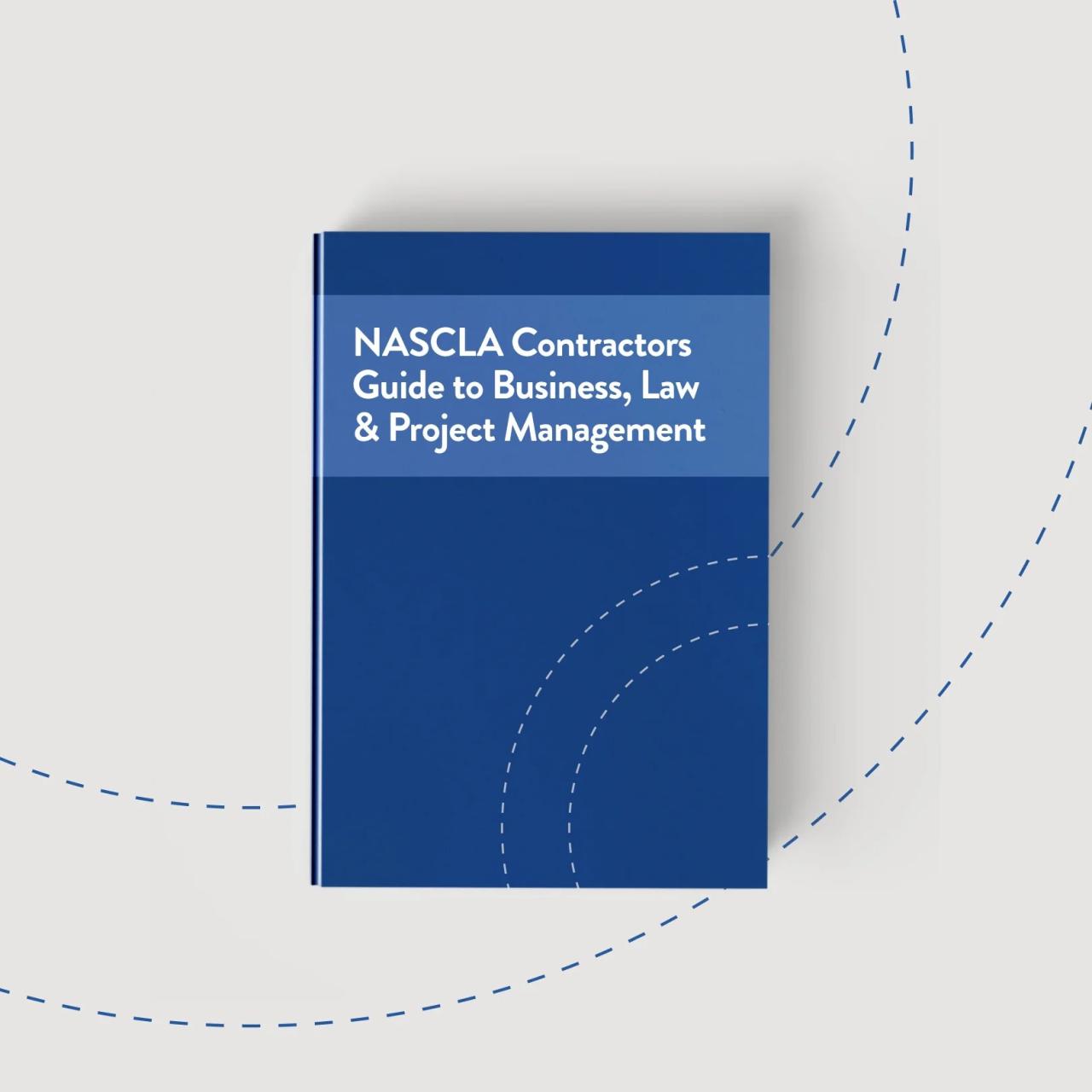The Nascla Contractors Guide to Business Law and Project Management is the definitive resource for contractors seeking to navigate the legal and managerial complexities of the construction industry. This comprehensive guide provides a thorough understanding of the legal framework governing contractor-client relationships, the key elements of effective business management, and the tools and techniques for successful project management.
Whether you are a seasoned contractor or just starting out, this guide will empower you with the knowledge and skills to succeed in today’s competitive construction market. With its clear explanations, practical examples, and case studies, the Nascla Contractors Guide to Business Law and Project Management is an invaluable tool for contractors of all levels.
Legal Framework for Contractors

The legal framework for contractors encompasses the key legal principles governing contractor-client relationships, the types of contracts commonly used in construction projects, and the legal issues that can arise during such projects.
Key Legal Principles
- Contract law: Governs the formation, interpretation, and enforcement of contracts between contractors and clients.
- Tort law: Provides remedies for civil wrongs, such as negligence, breach of duty, and misrepresentation.
- Property law: Defines the rights and obligations of ownership and possession of land and buildings.
- Statutory law: Includes laws and regulations specific to the construction industry, such as building codes and zoning laws.
Types of Contracts
- Lump-sum contracts: Fixed-price contracts where the contractor is paid a single sum for completing the project.
- Unit-price contracts: Contracts where the contractor is paid a fixed price for each unit of work completed.
- Cost-plus contracts: Contracts where the contractor is reimbursed for the actual costs of the project, plus a fixed fee or percentage.
- Design-build contracts: Contracts where the contractor is responsible for both the design and construction of the project.
Legal Issues
- Breach of contract: Failure by one party to fulfill their contractual obligations.
- Construction defects: Faults or errors in the construction of a building or structure.
- Payment disputes: Disputes between contractors and clients over payment for services rendered.
- Delay claims: Claims made by contractors for additional time or compensation due to delays in the project.
Business Management for Contractors

Effective business management for contractors involves key elements such as developing a business plan, managing finances, marketing the business, and providing excellent customer service.
Business Plan
A business plan Artikels the contractor’s goals, strategies, and financial projections. It is essential for securing financing, attracting clients, and managing the business effectively.
Financial Management
- Budgeting: Creating and managing a budget to control expenses and ensure profitability.
- Cash flow management: Monitoring and managing cash flow to avoid financial shortfalls.
- Tax planning: Minimizing tax liability through legal and ethical strategies.
Marketing
- Developing a marketing strategy to reach potential clients.
- Using a variety of marketing channels, such as online advertising, social media, and networking events.
- Building relationships with industry professionals and potential clients.
Customer Service
- Providing excellent customer service to build long-term relationships.
- Responding promptly to inquiries and resolving issues efficiently.
- Going above and beyond to meet customer expectations.
Project Management for Contractors

Project management in construction involves defining the project scope, planning the project schedule, and managing the project resources to ensure timely and successful completion.
Role of a Project Manager
The project manager is responsible for overseeing all aspects of the project, including planning, execution, and completion. They are the primary point of contact between the contractor and the client.
Phases of a Construction Project
- Planning: Defining the project scope, developing the schedule, and securing resources.
- Preconstruction: Preparing the site, obtaining permits, and purchasing materials.
- Construction: Executing the construction activities according to the plan.
- Post-construction: Completing the project, conducting inspections, and handing over the project to the client.
Tools and Techniques, Nascla contractors guide to business law and project management
- Project scheduling software: Gantt charts and critical path analysis.
- Project management software: Collaboration tools, document management, and communication.
- Lean construction: Eliminating waste and improving efficiency.
Risk Management for Contractors
Risk management in construction involves identifying, assessing, and mitigating risks that could impact the project. It is crucial for protecting the contractor’s interests and ensuring project success.
Key Risks
- Financial risks: Cost overruns, delays, and payment disputes.
- Operational risks: Construction defects, accidents, and equipment failures.
- External risks: Weather conditions, economic downturns, and political instability.
Risk Management Plan
A risk management plan Artikels the steps to identify, assess, and mitigate risks. It includes risk identification techniques, risk assessment criteria, and risk mitigation strategies.
Insurance and Bonding
- Insurance: Protects the contractor against financial losses due to accidents, damage, or lawsuits.
- Bonding: Provides financial guarantees to the client that the contractor will fulfill their contractual obligations.
Ethical Considerations for Contractors: Nascla Contractors Guide To Business Law And Project Management
Ethical behavior is essential for maintaining a positive reputation and building trust with clients. Contractors should adhere to ethical principles such as integrity, transparency, and fairness.
Ethical Principles
- Integrity: Acting with honesty and trustworthiness.
- Transparency: Disclosing all relevant information to clients and stakeholders.
- Fairness: Treating all parties involved in the project with respect and equity.
Ethical Dilemmas
- Conflicts of interest: When a contractor has a personal or financial interest that could compromise their objectivity.
- Bribery and corruption: Offering or accepting bribes to influence decision-making.
- Safety concerns: Balancing the need for safety with project deadlines and costs.
Questions Often Asked
What is the purpose of the Nascla Contractors Guide to Business Law and Project Management?
The Nascla Contractors Guide to Business Law and Project Management is designed to provide contractors with a comprehensive understanding of the legal and managerial aspects of the construction industry, enabling them to navigate these complexities and achieve greater success in their projects.
What topics are covered in the guide?
The guide covers a wide range of topics, including the legal framework for contractors, business management for contractors, project management for contractors, risk management for contractors, and ethical considerations for contractors.
Who should use this guide?
The guide is intended for contractors of all levels, from those just starting out to seasoned professionals. It provides valuable insights and practical guidance for contractors seeking to enhance their legal and managerial capabilities.